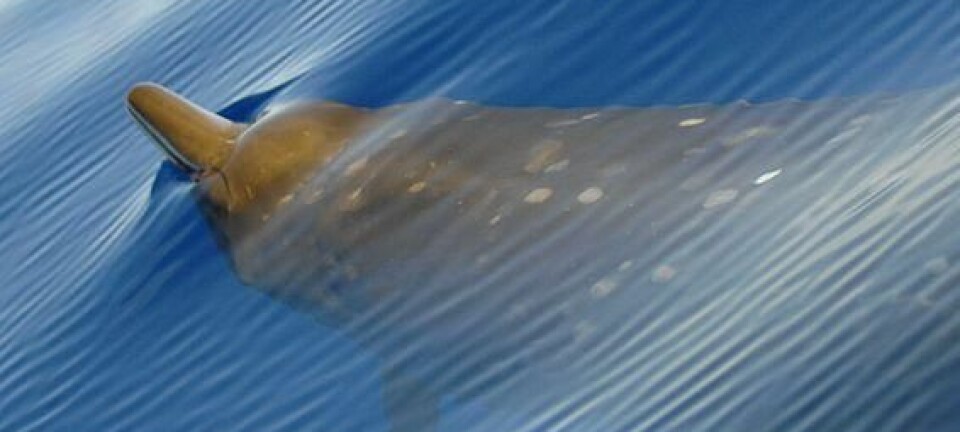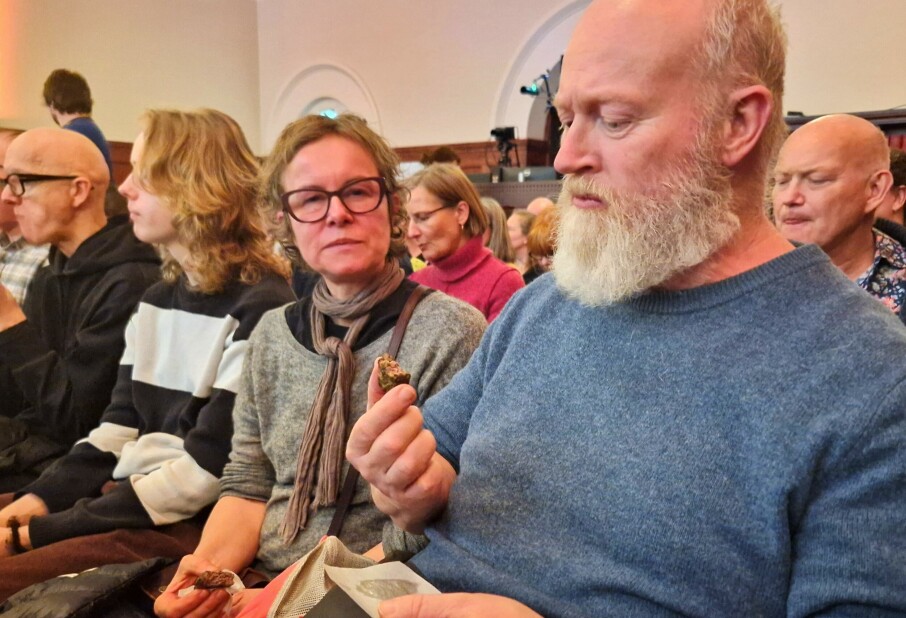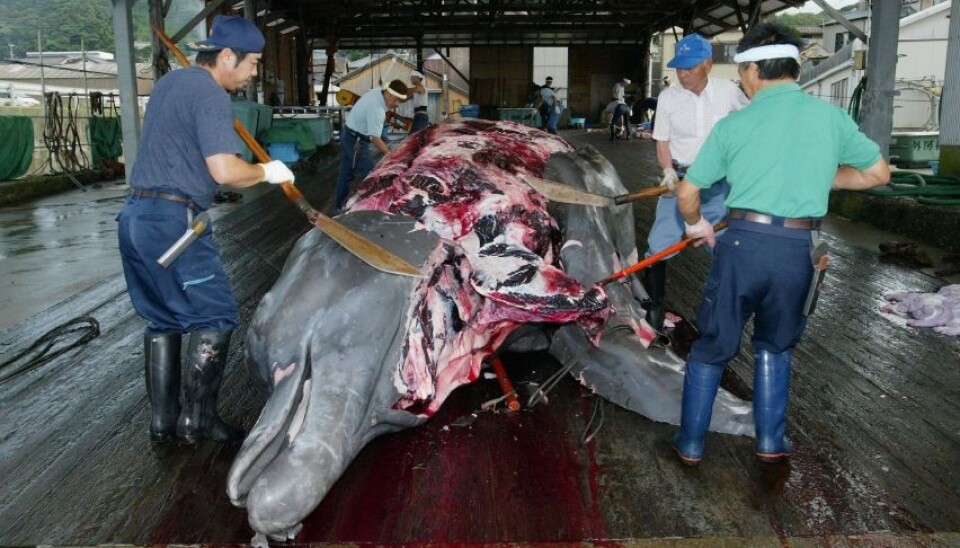
Quota system for preventing whaling
American researchers propose a cap-and-trade system that would enable environmentalists to pay whaling countries for each whale it refrains from killing. Norwegian experts don’t think the idea will float.
Denne artikkelen er over ti år gammel og kan inneholde utdatert informasjon.
Whaling continues to be a controversial issue. Japan, Norway, Iceland, Denmark and a couple of other countries still allow commercial whaling, where domestic sales and research are still used to defend the hunting of these mammals.
Most other countries consider whaling morally reprehensible and ecologically unacceptable – or both – and call for a total ban on the exploitation of these marine giants.
Three American researchers now propose a quota, or cap-and-trade, system for the hunt along the lines of the CO2 quota trading system as outlined in the Kyoto agreements.
The idea is that countries that otherwise would annually hunt a certain number of whales, could sell their quotas in one-whale equivalents, for instance to a nature conservation organisation. This would entitle the quota owner to kill one whale, a right that a green group would of course refrain from using.
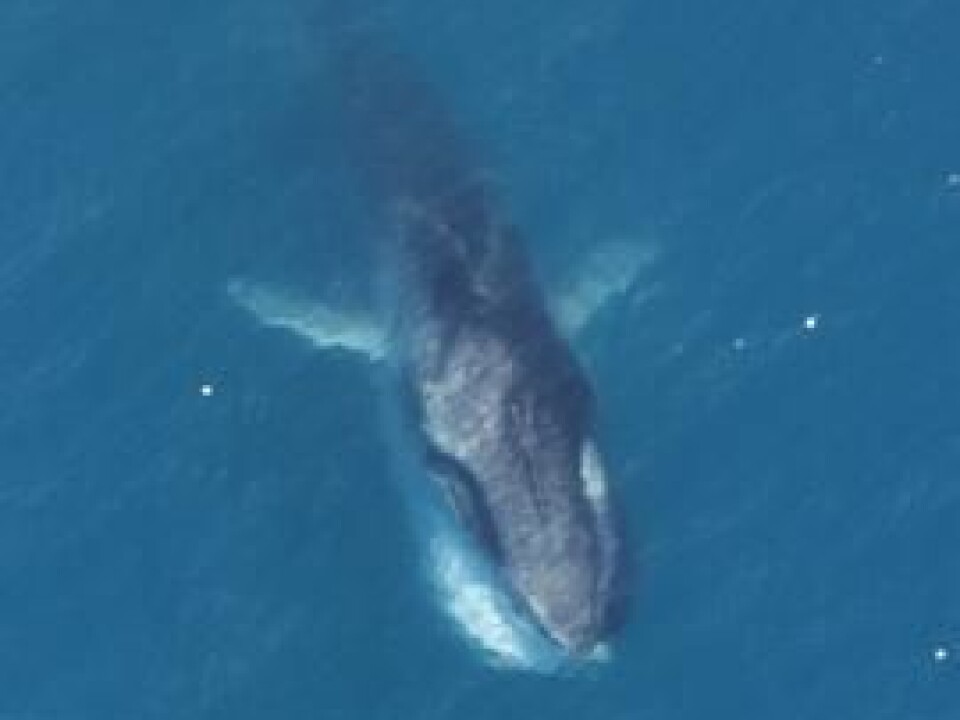
This would allow whalers to continue earning money in their trade, without actually hunting down and harpooning the animals.
“The proposal is fairly interesting in theory, but I don’t think it has any chance of being accepted,” says Steinar Andresen, professor at the Fridtjof Nansen Institute in Bergen and an expert on international agreements and whaling regulations.
Up to $85,000 for a whale
The professor of environmental and resource economics Christopher Costello and ecologists Steven Gaines and Leah R. Gerber have come up with a proposal for establishing an international quota system. In an article in the journal Nature they suggest that each whale now hunted should be given a price tag equal to its commercial value on the market.
Their calculation, based on the annual earnings of the international whaling industry, show that a single minke whale – one of the smallest and least commercially valuable whales – would be worth about $13,000 in this system.
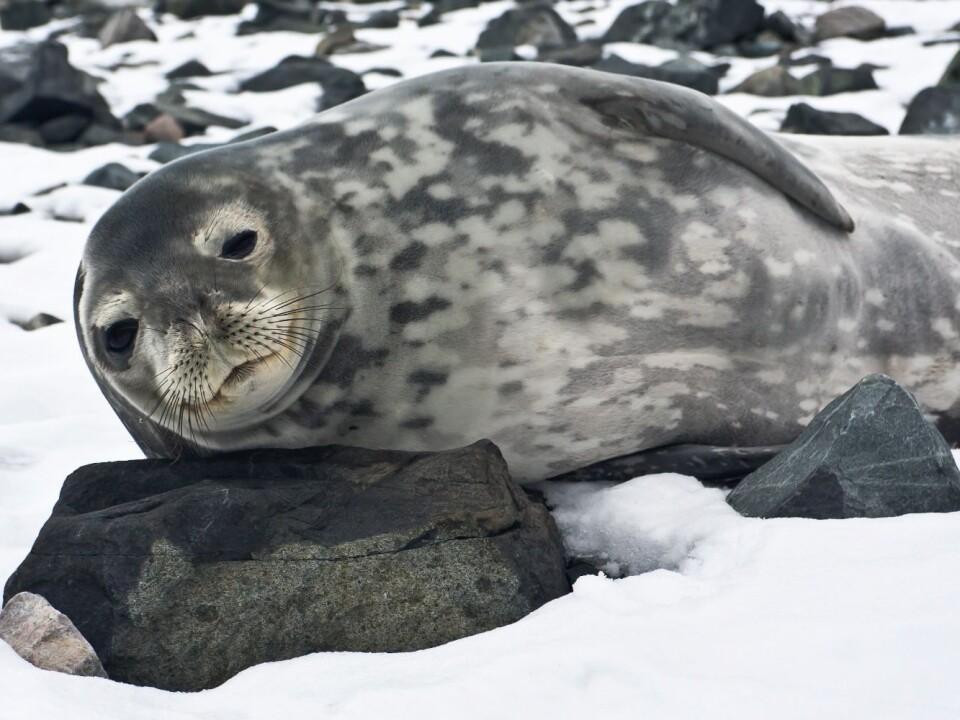
The Rolls Royce of their marine mammal market would be the fin whale, which would sell for $85,000 in this cap-and-trade system.
The researchers write that conservationist groups, which already spend millions of dollars annually campaigning and demonstrating, could put their resources to better use by essentially paying protection money for hundreds of whales, for instance to Norwegian whalers.
They write that the annual quotas ought to be set and administered by the International Whaling Commission (IWC) and distributed among the whaling nations and other countries on the basis of historical whaling figures. A certain amount of the quotas would be accessible on an open auction market, where anybody with a fat enough wallet could purchase a whale quota.
“By placing an appropriate price tag on each whale, this conservation market could comprise a direct and concrete way to save the whales. The market would potentially be a win-win situation for all parties,” write the researchers.
We could buy out the entire industry
“This quota system is an enticing thought,” comments Bjørn L. Basberg, professor in economic history at the Norwegian School of Economics. His research includes the history of the Norwegian whaling industry.
“The Norwegian whaling industry is very small, so an international auction system like this would probably suffice to buy out the entire Norwegian whaling quota,” he says.
Whaling is banned by the IWC, but a few countries – Norway among them – have reserved themselves against the moratorium. Thus they can hunt a certain number of whales a year, even though it’s without the official approval of the IWC.
The only whales hunted in Norway are minkes. This whaling takes place along the Norwegian coast and Norway has operated with a total quota of 1,286 minke whales annually in recent years. According to the Fishery and Aquaculture Research Fund the Norwegian whaling industry had a turnover of NOK 18 million in 2009 – about $3 million.
“In economic terms, whaling is a pittance. There’s hardly any money in it at all. Norway doesn’t even catch its quota because we only sell to the Norwegian market,” says Steinar Andresen.
Japan, which could potentially buy Norwegian whale meat in an open market, doesn’t currently import whale products. The Japanese are restrained by fears of sanctions from the USA, their largest trading partner and a strong opponent of whaling and sales of whale products. Domestic Norwegian demand is insufficient for a viable use of the country’s entire whaling quota.
Regulation problems and opposition on principle
The researchers acknowledge in the article published in Nature that their proposed system would be hard to implement. For instance it’s uncertain what sort of sanctions could be imposed on prospective rule-breakers.
The oceans are vast, IWC controllers can’t cover all the fish and meat markets of the world, and there’s a real threat that some boats would hunt down and sell whales on a black market, despite the sale of their quotas to conservationists.
Costello and his colleagues write in their article that a global registry of whaling vessels and a tight supervision of the whale market, in addition to public access to pricing and trade agreements, would help to make the system work properly.
“Certainly the enforcement and regulation could be problematic. One thing is what goes on along the Norwegian coast. The Southern Ocean, where the Japanese do a lot of whaling, is a whole different story. It’s harder to regulate and enforce the whaling there – although of course that’s no reason not to try,” says Basberg.
Considered disgusting
Another unresolved issue when it comes to halting or reducing whaling, is whether killing whales should be tolerated at all. Steinar Andresen thinks this is the biggest barrier against an international regulation of the whaling industry.
“The two main parties, the whaling nations and the conservationists, won’t reach an agreement on how large quotas can be or what price to put on the life of a whale. This requires an academic and rational approach to a subject that isn’t the least bit rational,” he says.
Andresen explains that quota systems and other proposals to shepherd international whaling into an officially approved regime have been discussed in the IWC since 1982. Earlier suggestions involved the purchase of annual catch quotas from the IWC by whaling countries. The proceeds from the sales would then fund protection measures for the species.
“Although this is a novel approach, I don’t think any unity can be reached with this idea either. The opponents are against whaling as a matter of principle – they consider it morally reprehensible to hunt whales,” says Andresen.
Phil Kline, a Greenpeace spokesman in the USA, said in a news article in the magazine Science that “the whole idea of the resumption of commercial whaling is abhorrent.”
“In addition, the distribution of prospective quotas would trigger another problem. The whaling nations would protest about the quotas being distributed to 70-80 countries that have never hunted whales,” Andresen asserts.
“Also, they wouldn’t consent to letting all these quotas be sold to conservationists, which would totally put a stop to the industry. So this is an interesting proposal in theory, but for all practical purposes it would be unacceptable to all parties,” he says.
Faith in the market
“I think the international whaling industry will continue to scrape by like they have been, with business as usual. Those who want to hunt whales will continue as long as they like and their opponents will have a good cause to fight for the entertainment of their supporters,” says Andresen.
He has more faith in pure market mechanisms for regulating the whaling industry internationally.
“The market will gradually shrink, just because less whale meat is consumed. There is even falling demand in Japan; young people hardly know what whale meat is. There certainly won’t be an increase in whaling in the years to come.”
“I think the market is a more important regulating mechanism in this field than politics, at least in the long run,” he says.
Sustainable source of food
Nor is Bjørn L. Basberg so certain that terminating whaling is intrinsically a smart move.
“You can question whether it’s advisable to end Norwegian whaling in this way. There are lots of good reasons for the catch,” he says.
“For instance there’s a worldwide food shortage and minke whale stocks along the Norwegian coast are clearly sustainable enough for them to be exploited without any problems,” he asserts.
Basberg points out that Greenland is on the verge of drowning in seals after the EU imposed a ban on imports of sealskins and the hunt collapsed.
“Many would surely say that to refrain from harvesting sustainable stocks is unwise,” he concludes.
Translated by: Glenn Ostling







